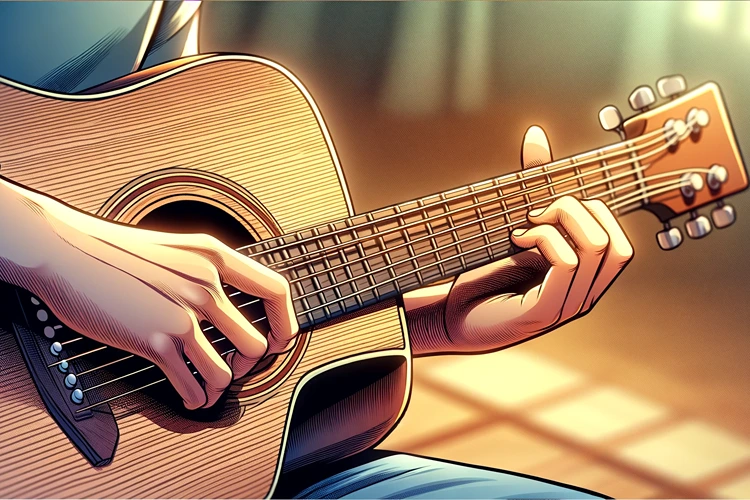Starting your musical journey with the right guitar can make a world of difference. Picking the perfect first instrument is crucial for any budding guitarist. But with so many options, how do you choose? This guide will help you navigate the sea of beginner guitars, ensuring you find the one that resonates with your musical aspirations.
Why the Right Guitar Matters
Your first guitar sets the tone for your musical journey. A good fit encourages practice, growth, and, most importantly, joy in playing. But what makes a guitar right for beginners?
- Playability
- Comfort
- Sound quality
Acoustic vs. Electric: Making the Choice
The acoustic versus electric debate is a starting point for many. Here’s what you need to know:
Acoustic Guitars
Ideal for singer-songwriters and those leaning towards folk or country. Acoustic guitars are great for learning the basics of chord progression and strumming patterns.
Electric Guitars
Perfect for aspiring rockstars. Electric guitars offer ease of playability with lighter strings and a wide range of sounds when connected to amplifiers.
Helpful Hint:
Consider the music you love listening to when choosing between acoustic and electric. Your passion for the genre will fuel your learning.
Top Picks for Beginner Acoustic Guitars

Choosing the right acoustic guitar is a pivotal decision for beginners. A good guitar should not only be easy to play but also inspire you to practice and improve. Here are detailed insights into some top choices that combine quality, playability, and affordability.
Yamaha FG800
The Yamaha FG800 stands out for its solid spruce top, known for delivering crisp, vibrant tones ideal for a broad range of music styles. Its durability and excellent sound quality make it a go-to choice for beginners. Noteworthy features include:
- Nato/Okume back and sides for a warm, balanced sound.
- A comfortable neck profile that suits a wide range of hand sizes.
- Scalloped bracing, enhancing the guitar’s volume and projection.
Fender CD-60S
Fender’s CD-60S is celebrated for its rich, full-bodied tone, thanks to its all-mahogany body. It’s an all-rounder that appeals to beginners for its ease of play and affordability. Highlights include:
- A dreadnought body shape that projects robust sound.
- Easy-to-play neck, making it comfortable for extended practice sessions.
- Quality craftsmanship at an entry-level price point.
Top Picks for Beginner Electric Guitars
Embarking on an electric guitar journey opens up a world of musical genres. The right electric guitar should offer smooth playability and versatility as you explore your sound. Below are some top recommendations.
The Squier by Fender Affinity Stratocaster
This guitar is a favorite for its flexibility across genres, from rock to blues. The Affinity Stratocaster features:
- A lightweight, comfortable body that’s easy to handle.
- Three single-coil pickups that provide a range of tones, from sharp and clear to warm and mellow.
- A slim, “C”-shaped neck profile that’s particularly friendly for beginners learning chords and solos.
The Epiphone Les Paul Special-II
The Les Paul Special-II is an excellent introduction to the classic Les Paul line, offering a user-friendly experience with its iconic design and warm tones. Standout features include:
- Two humbucker pickups that deliver the rich, Les Paul signature sound.
- A lightweight mahogany body that’s comfortable for both standing and seated play.
- An approachable price point for the quality and heritage it represents.
Each of these guitars has been chosen for its ability to meet the needs of beginner players, offering a balance of quality, playability, and affordability. Whether you’re drawn to the acoustic resonance of the Yamaha FG800 and Fender CD-60S or the electric versatility of the Squier Affinity Stratocaster and Epiphone Les Paul Special-II, your perfect first instrument is out there.
Understanding Guitar Features
Choosing a guitar involves more than just picking a type. Features like the guitar’s body shape, wood type, and string material significantly impact playability and sound.
Body Shape and Size
The guitar’s body shape affects its sound projection and comfort. Smaller bodies are easier for beginners to handle, while larger bodies offer richer sound.
Wood Type
The wood used for the guitar’s top, back, and sides affects its tone. Spruce tops are bright and dynamic, while mahogany offers a warmer sound.
String Material
Acoustic guitars typically use steel strings, known for their bright, crisp sound. Nylon strings, found on classical guitars, are softer and easier on the fingers.
Helpful Hint:
When testing guitars, pay attention to how the neck feels in your hand and the ease with which you can press the strings down. Comfort is key.
Setting Your Budget
Your budget plays a crucial role in choosing a guitar. Fortunately, quality beginner guitars are available across a range of prices.
Price Ranges
- Under $200: Ideal for absolute beginners, offering decent quality to start your journey.
- $200-$500: Mid-range guitars with better craftsmanship and sound quality.
- Above $500: Higher-end guitars for serious beginners committed to pursuing music long-term.
Investing Wisely
Consider your guitar an investment in your musical future. A slightly higher upfront cost can lead to better learning experiences and longer instrument life.
Where to Buy Your First Guitar
Whether you decide to buy in-store or online, where you purchase your guitar can affect your decision-making process.
Local Music Stores
Buying from a local store allows you to try different guitars and get expert advice. Store staff can help you find a guitar that suits your needs and preferences.
Online Retailers
Online shopping offers convenience and a wider selection. Look for retailers with good return policies and customer reviews.
Stats:
Research indicates that 60% of beginners prefer purchasing guitars in-store to ensure the feel and sound match their expectations.
FAQs
Bottom Line
Choosing your first guitar is an exciting step on your musical journey. By considering the type, features, and budget, you can find an instrument that not only helps you learn but also keeps you motivated to play every day. Remember, the perfect first guitar is one that feels right in your hands and resonates with your musical soul. Let your passion guide your choice, and you’ll find the perfect partner for your musical adventures.
Additional Resources
- Guitar Center: A comprehensive resource for guitars of all types, offering detailed product descriptions and user reviews to help beginners make informed decisions.
- Sweetwater: Known for its extensive collection of musical instruments and gear, Sweetwater provides expert advice and guides on choosing the right guitar for beginners.

